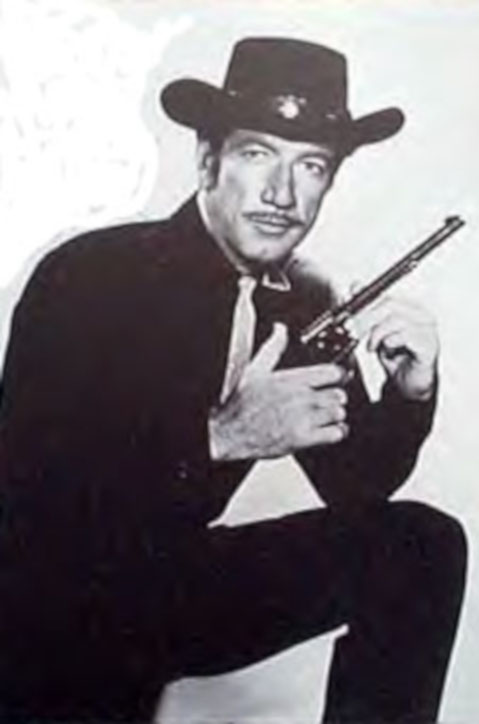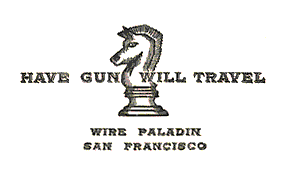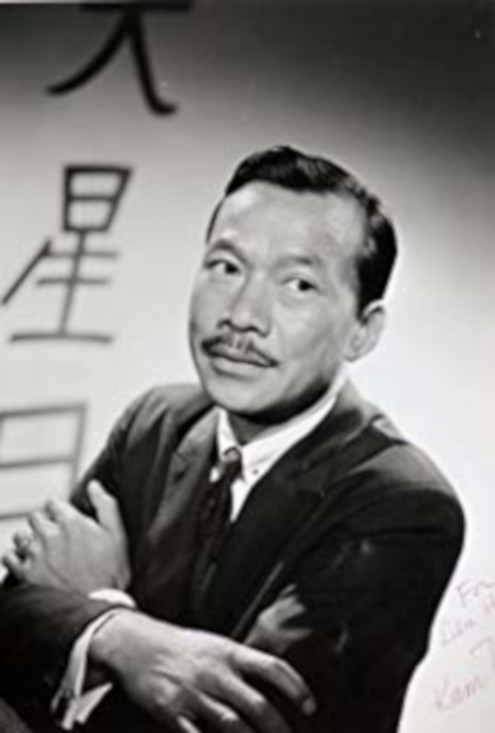My parents brought me to America in 1957. There was very little work in the United Kingdom after the war and there were constant shortages; life was hard. But, life in downtown Rutland, Vermont, was great. There were plenty of jobs, there was always food in the markets, and our home was warm in the winter. My father bought a brand new green Chevrolet and on a Friday afternoon that September he brought home a television.
The very next day a new chapter in my life began. I was thirteen and the CBS television network aired the debut episode of Have Gun Will Travel. My most vivid memory of those years is that nothing could stop me from being in front of our little ten inch Sylvania, with halo-light, every Saturday night at nine-thirty. I’m not sure if I saw all 164 episodes, but I missed very few.
Those of you who share my passion for 50s television know that Have Gun Will Travel recreated the myth of renaissance chivalry in post-Civil War America. The popular CBS television program aired from September 14, 1957 to 1963 and centered on a character named Paladin, a college educated gunslinger who upon payment of one thousand dollars would depart his lavish suite in San Francisco’s Hotel Carlton to handle whatever mission of justice his wealthy client had commissioned. Paladin was played by Richard Boone, who first made himself known to TV audiences with his portrayal of Dr. Konrad Styner in the hospital drama: Medic.
Boone was born in 1917 in Los Angeles and was a seventh generation nephew of frontiersman Daniel Boone. He received his education at Stanford University and the Strasberg Actors’ Studio. Boone established himself as an accomplished actor in the 1940s doing stage plays and live-TV in New York City.
Have Gun Will Travel was created by two former radio writers who had inside information that CBS was looking for a cowboy show with a twist. They crafted the first truly adult TV western, a series based on a character who named himself after the legendary officers of Charlemagne’s medieval court. Boone’s character lived a life-of-ease, after a troubled experience as a Union Army officer in the Civil War. He was a cultured gunfighter who quoted Keats, Shelley, or Shakespeare with the same skill as he handled a six-shooter.
The producer’s first choice for the part of Paladin was the western movie icon Randolph Scott, but he was under contract to a movie studio and unavailable for television work. When Boone was selected to be Paladin, the producers were overjoyed when they learned that he could actually ride a horse, after all the entire project hinged on Boone’s ability to play a “high IQ gunslinger.” Boone’s intimidating growl, prominent nose and pock-marked face, physically distanced him from the standard baby-faced cowboy hero in the same way that his character’s cultured background distinguished him from the average, prairie-tutored rough-neck.
/The show’s identifying graphic was Paladin’s calling card — bearing an image of the white knight chess piece and the inscription, Have Gun Will Travel . . . Wire Paladin San Francisco. The responses the cards generated were delivered to Paladin by the only other continuing character in the show – an Oriental hotel employee named Hey Boy. (Hey Girl in 1960-61 season when actress Lisa Lu temporarily replaced actor Kam Tong who had moved to another program.)
Kam Tong
Without an ensemble cast, the entire weight of the series rested on Richard Boone. Paladin’s mannerisms and motivations had to be what propelled and interlocked the episodes from week to week and season to season. Unlike the archetypal western hero, Paladin wore black rather than white, complete with a hat embellished by a band of silver medallions and a holster embossed with a silver chess knight. He wore a villain’s mustache and wasn’t enamored of his horse; declining even to justify its existence with an appealing name. And, he seemed to relish the adventures of the mind far more than his confrontations with evildoers from which he earned his livelihood.
Have gun, will travel read the card of a knight without armor in a savage land. Richard Boone died in 1981.
My knowledge of celebrity postcards is nil. But you can ask me anything about those pictured on them and I think I can give you an answer. I have paid as little as ten pence for an arcade card and as much as ten pounds for a postcard. I have dozens of arcade cards and hundreds of photographs. I would be willing to buy more postcards, especially if they have pictures of my childhood idols, but the simple truth is, I can’t find any. The card displayed with this article is the only one I have.



Loved this one! I watched nearly all the Have Gun Will Travel shows. And that music – it takes me right back to that old RCA TV set. I did not realize that he did not name his horse. It was interesting to learn that Kam Tong was the only other regular actor in the show. I wish Kaya Fellcheck lots of fun travels in her retirement adventures across the USA.
I really look forward to your biweekly posts, the diversity of cards and the detail of their stories.
This one brought a particularly large smile to me face.
Glad to hear you like the variety of subjects. We are trying our best to explore the world one postcard at a time.
Your doing a great job of it.
Still enjoy watching reruns of Have Gun Will travel. You can still see them most weeks on the channels that show 1950’s and 60’s shows.
This is a fantastic article. I too watched this show for many years. we were allowed to stay up past our bedtime due to it being a weekend. I was young but also picked up on the contrasts of him wearing black and looking like a villian. I will check my postcards (i am a dealer) to see if I have any Richard Boone cards. bob toal
Love this article and the days of black and white TV are still pretty fresh in my memory. Neat that the author came to USA from Great Britain, and that she and her family found a new chapter in their life in Vermont. I would encourage her to keep looking for tv stars on postcards. Troll ebay and I bet that something will show up. Thanks for this wonderful article.